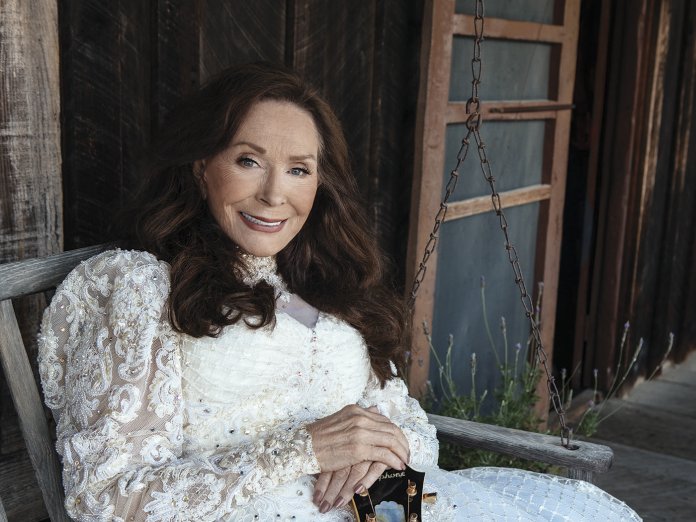Personal narrative is the lifeblood of country music, and Loretta Lynn has a history more famously potent than most. One of eight children born to a Kentucky coal miner, she married at the age of 14 and endured a long, abusive relationship, became the first woman to win the CMA’s Entertainer Of Th...
Personal narrative is the lifeblood of country music, and Loretta Lynn has a history more famously potent than most. One of eight children born to a Kentucky coal miner, she married at the age of 14 and endured a long, abusive relationship, became the first woman to win the CMA’s Entertainer Of The Year Award (in 1972) and is widely acknowledged as a pillar of the genre. It’s a story of struggle and success that’s sustained multiple retellings, whether in memoir, movie or album, and her 50th full-length is another iteration, with a slight twist.
This year Coal Miner’s Daughter marks its half-century, which makes Still Woman Enough a celebratory release. It’s a mix of reworkings of originals from the ’60s and ’70s and fresh interpretations of traditional songs, plus one new number, the title track, which was co-written with her daughter Patsy Lynn Russell. Margo Price and Carrie Underwood are among the guests, younger carriers of what Lynn calls the “real country” baton. But it’s a celebratory release in another sense: the “survivor” trope may be problematic in terms of representing female experience, but it’s also a core element of country songwriting. Lynn, however, who turns 89 in April, has thrived, rather than simply survived.
Between 2013 and 2017 she recorded more than 90 songs, and these 13 date from the later part of that period. Unsurprisingly, there’s been no major style makeover and Russell, who co-produced with John Carter Cash, admits that when her mother first told them she wanted to re-record some of her older songs she was unenthusiastic, owing to her closeness to the originals. “I love the sound of tape and the youthfulness of her voice,” she told Uncut. “But it was my mom who said these are my songs and this is my record. Once we started tracking the older hits my mom wrote and she was singing them, it became so clear to us that this music was fresh and relevant to her.”
Lynn reasserts her relevance right at the start, with the new title track. It’s the bookend to closer “You Ain’t Woman Enough”, which features Tanya Tucker and is Lynn’s signature hit from 1966. In it she warns a challenger off her beau with a startlingly blunt smackdown that also raises a smile: “Women like you they’re a dime a dozen, you can buy ’em anywhere/For you to get to him I’d have to move over and I’m gonna stand right here”. The new song directs that same fierce energy towards a more self-sustaining end, also voicing it – in the company of Underwood and Reba McEntire – as a broader declaration of female strength. Over a gutsy and hard-swinging, barn-dance tune, Lynn, whose voice has deepened through the years but lost none of its fire, declares, “There’s been times life’s got me down, pick myself up and bounce right back around/ I wasn’t raised to give up and to this day, you know what – I’m still woman enough”.
Canonical original “Honky Tonk Girl”, Lynn’s debut single from 1960, and “My Love”, a track from her 1968 compilation album, are included. The walking bass and lashings of steel guitar on the former are intact, but piano has been introduced, while the Tejano-toned “My Love” has been relocated several degrees further south, to richer romantic effect. “The Pill”, one of Lynn’s best known (and most controversial) songs, doesn’t feature; maybe it was judged overfamiliar and too anachronistic or, more likely, one number about the politics of female reproduction was enough. Whichever, Shel Silverstein’s “One’s On The Way” sees Margo Price – who performed it at Lynn’s 87th birthday tribute while heavily pregnant – trading verses with Lynn from shared experience, the pair of them making light work of its comic element.
Respect is paid to foundational country music both secular and spiritual. With Lynn’s new arrangement and the heft of her own history behind it, threadbare standard “Old Kentucky Home” becomes a sweetly literal example of roots music. A cover of Hank Williams’ country-gospel classic “I Saw The Light” shines and Lynn’s voice raises the (church) roof on “Where No One Stands Alone”, but the set’s centrepiece, literally and emotionally, is “Coal Miner’s Daughter (Recitation)”. A reprise of her 1970 signature hit, it’s a deeply personal declaration freighted with sociological meaning, and Lynn makes it with quiet pride and no sugar added, just spare banjo accompaniment. “A lot of things have changed since way back then and it’s so good to be back home again”, she muses. Still Woman Enough may be sustained by her memories, but it’s not overshadowed by them.



